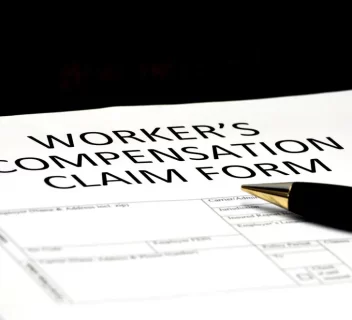Navigating Work Accident Injury Claims: A Step-by-Step Guide
Injured at work? This guide covers everything you need to know about work accident injury claims. Learn how to report your injury, file a claim, and understand your rights to secure the compensation you deserve.
Key Takeaways
- Understanding the legal rights and options after a workplace injury is crucial for injured employees to secure compensation for medical expenses and lost wages.
- Prompt reporting of the injury, seeking medical attention, and thorough documentation are essential steps to successfully navigate the workers’ compensation claims process.
- Injured workers should consider hiring a personal injury lawyer to overcome challenges with insurance companies, maximize compensation, and ensure proper representation throughout the claims process.
Understanding Work Accident Injury Claims
Work accident injury claims are legal processes through which employees seek compensation for injuries sustained when they are injured at work. Such a workers’ comp claim can be intricate, encompassing:
- Medical care
- Consulting an attorney
- Negotiating a settlement
- Possibly going to court
The journey begins with understanding the types of injuries that often occur and the legal rights workers possess post-injury.
Workplace injuries are alarmingly common. In 2022 alone, 2.8 million workplace injuries and illnesses were reported. Accidents happen, and injuries can range from broken bones to repetitive stress injuries, often resulting from trips, falls, machinery accidents, or physical overexertion. If you are injured on the job, it is important to understand your rights and options regarding work related injury, workplace accidents, and work related injuries and an on the job injury.
Injured workers must understand the legal intricacies and options available for claiming compensation to alleviate financial burdens, such as medical treatment costs and lost wages for an injured employee.
Common Types of Workplace Injuries
Slip and fall incidents are the most frequent culprits behind workplace injury claims, particularly in the United States. Machinery-related accidents can lead to severe injuries and significant claims. Most workplace injuries are eligible for workers’ compensation, underscoring the importance of understanding the types of injuries one might encounter on the job.
Such injuries not only disrupt lives but also highlight the need for a robust workers’ compensation system to support affected employees.
Legal Rights After a Workplace Injury
Injured workers may have multiple legal options for compensation, including the right to file a workers’ compensation claim (if they qualify). Workers’ compensation typically covers medical expenses, lost wages, and disability benefits. Moreover, compensation in an injury claim may also cover damages related to the injury, ensuring that injured employees receive fair compensation for their suffering.
Understanding these rights is fundamental for navigating the aftermath of a workplace accident.
Initial Steps After a Workplace Injury
When a workplace injury occurs, swift action is crucial. Key steps that can significantly impact the outcome of your claim include:
- Reporting the injury promptly to your employer fulfills legal and insurance requirements and helps determine the next steps.
- Seeking medical attention.
- Documenting the incident.
Additionally, timely communication ensures a smooth and fair resolution of workplace injury claims.
Securing the scene and gathering evidence early on helps preserve crucial details for legal proceedings or legal action regarding insurance claims. Quick action strengthens your case and aids in obtaining the compensation you deserve.
Report the Injury to Your Employer
Reporting a workplace injury promptly is essential for the success of your workers’ compensation claim. Failure to do so can lead to the loss of your right to receive benefits. Most states require that the injury be reported to the employer on the same day or within a few days.
When reporting, provide a written report and keep a copy of the completed claim form for your records. This documentation helps track and ensure that the employer reports the accident to the workers’ compensation insurance carrier.
Seek Medical Attention
Immediate medical attention after a workplace injury prevents insurance companies from questioning the severity of your condition and documents the extent of your injuries for your claim. Medical records serve as essential evidence, providing proof of injuries and their associated medical bills.
Detailed documentation of your medical treatment and condition is crucial for a successful workers’ compensation claim. Even minor injuries can have serious underlying conditions, so seek prompt medical attention.
Document the Incident
Thorough documentation of the incident is essential for your injury claim. Important elements to collect include:
- Witness statements, which can enhance the credibility of your claim
- Photographs
- Any involved equipment
- Surveillance footage, if available, serves as powerful evidence
Gathering and preserving evidence establishes a solid foundation for your workplace injury claim, ensuring accurate representation of the circumstances of your injury.
Filing a Workers’ Compensation Claim
Filing a workers’ compensation claim is crucial for managing injury claims. Workers’ compensation offers benefits for medical costs and lost income. However, proving claims can be difficult without clear documentation. Prompt reporting, following the doctor’s advice, and documenting the incident are key actions for a successful claim. The process requires careful attention to detail to ensure fairness and efficiency.
The main benefits of workers’ compensation include easier payouts and a more efficient claims process. Understanding the process and knowing what to do if your claim is denied can improve your chances of receiving the workers’ comp benefits you deserve.
Eligibility for Workers’ Compensation Benefits
Most workplace injuries are eligible for workers’ compensation coverage. Workers’ comp has up to two years from the date of injury to file a claim, but eligibility depends on state jurisdiction.
Understanding your eligibility is the first step to ensuring you recover compensation and receive the compensation you deserve.
Completing the Claim Form
Filing your workers’ compensation claim promptly and accurately is essential for maximizing your potential settlement. Fill out all sections of the claim form completely and truthfully. Inaccuracies or omissions can delay the process or result in a denied claim.
Keep copies of all submitted documents and maintain detailed records throughout the process to help in case of disputes.
What to Do If Your Claim Is Denied
If your workers’ compensation claim is denied, here are the steps to take:
- Appeal the decision.
- Consider mediation before a hearing if the claim is rejected.
- Consult a personal injury lawyer for guidance and to improve your chances of a successful appeal.
Persistence is key in navigating the complexities of the workers’ compensation system.
Personal Injury Lawsuits vs. Workers’ Compensation Claims
Injured workers have multiple avenues for compensation, including workers’ compensation and personal injury claims. However, these paths differ significantly. Personal injury claims hinge on establishing fault, whereas workers’ compensation operates on a no-fault basis. Accepting workers’ compensation benefits typically prevents suing the employer, but exceptions exist, especially if a third party is involved.
Understanding these differences is essential. Personal injury cases focus on negligence and can potentially allow for higher compensation, including non-economic damages like pain and suffering. Workers’ compensation covers medical expenses and lost wages without requiring proof of fault.
Knowing when to pursue a personal injury lawsuit versus a workers’ compensation claim can significantly impact your compensation.
Fault and Liability in Personal Injury Cases
In personal injury cases, proving negligence is crucial, particularly when third parties are involved. Comprehensive documentation, including details of the accident, medical treatment, and relevant conversations, is essential for a successful claim.
Unlike workers’ compensation claims, personal injury claims allow for the recovery of all damages, including future expenses and non-economic damages like pain and suffering. However, pursuing a personal injury claim may affect the amount you can claim in workers’ compensation benefits.
Types of Damages Recoverable
Personal injury lawsuits can recover all forms of damages, including future costs and non-economic damages. Pain and suffering damages account for noneconomic losses linked to physical and emotional distress. Injured workers can be compensated for pain and suffering, wage loss, loss of income potential, property loss, medical expenses, and personal injuries.
Workers’ compensation benefits do not cover pain and suffering or other damage categories. Understanding the types of recoverable damages can help in evaluating the best course of action for your injury claim.
The Role of a Personal Injury Lawyer
A personal injury lawyer can be your strongest ally after a workplace injury. They:
- Help ensure victims receive fair compensation
- Navigate the complexities of work accident injury claims
- Defend your interests against insurance companies
The initial free consultation with a qualified legal professional is confidential, making it accessible for injured workers. Legal networks and services like 1-800-THE-LAW2 can connect you to local attorneys who have experience handling work accident injury claims.
Hiring an experienced lawyer can significantly improve the outcome of your injury claim. They guide you through the legal process, ensuring you understand your rights and options. An experienced work injury attorney can navigate the complexities of your claim, helping you achieve a fair settlement and maximum compensation.
How a Lawyer Can Help with Your Claim
Consult a lawyer if you encounter complications with your workplace injury claim. Insurance companies often aim to minimize payouts, so legal representation is essential during negotiations. A lawyer can assist with the workers’ compensation process, defend your interests if the claim is denied, and provide legal insights.
A workplace injury lawyer also plays a key role in maximizing the recovery of damages during a personal injury claim. If a loved one dies due to workplace negligence, a lawyer can help file a wrongful death suit.
Choosing a Qualified Lawyer to Represent You
Hiring an experienced lawyer is crucial for navigating the complexities of workplace injury claims, ensuring you understand your rights and options. A personal injury lawyer provides essential services such as investigating your case, negotiating with insurance companies, and representing you in court to maximize your compensation.
Choose a lawyer with a strong track record in handling work accident injury claims to ensure the best possible outcome for your case.
Common Challenges in Work Accident Injury Claims
Dealing with work accident injury claims can be challenging for an employee. Working with an attorney can help overcome these challenges and protect your rights. Legal counsel can safeguard workers against retaliation and ensure proper handling of adverse actions.
Retaliation claims can be brought against employers who take adverse actions in response to reporting safety violations or suing for injuries. Adverse actions include:
- Termination
- Failing to give a promotion
- Demoting
- Creating a hostile work environment.
Understanding and preparing for common challenges can significantly improve your chances of a successful claim. Each step in the whole process, from dealing with insurance companies to proving the extent of your injuries, requires meticulous attention to detail and strategic planning.
Dealing with Insurance Companies
Lawyers can handle negotiations with insurance companies, which often aim to minimize payouts. Document all interactions with insurance adjusters, as their statements may be used against you later.
An insurance company may question the validity of your injury, making comprehensive documentation essential for a successful claim.
Proving the Extent of Your Injuries
Medical documentation is crucial to demonstrate the severity and financial impact of your injuries. Detailed records of medical treatments and communications can bolster your case in compensation negotiations. Expert testimony can enhance a personal injury case by providing professional insights into the nature and implications of the injuries sustained.
Insurance companies may attempt to minimize payouts by questioning the validity of the injury, so thorough documentation of the incident and related medical care is crucial for a successful claim.
Maximizing Your Compensation
Maximizing your compensation involves a strategic approach that includes:
- Keeping a record of all medical appointments, treatments, and expenses incurred.
- Understanding your disability rating, as it significantly affects the benefits you may receive.
- Following the specified tips for a successful claim.
- Knowing the factors that influence settlement amounts helps achieve the maximum compensation.
Settlement amounts for work injury disputes vary based on the severity of the injury and supporting evidence. Being well-prepared with detailed records and a clear understanding of your legal rights can significantly impact your ability to negotiate a fair settlement. Engaging an experienced lawyer can further enhance your chances of securing the compensation you deserve.
Keeping Detailed Records
Keeping meticulous records of all expenses and impacts related to your injury can strengthen your claim. Medical records, receipts for treatments, and documentation of lost wages are all critical pieces of evidence. The more detailed and organized your records are, the stronger your position will be during settlement negotiations.
Gather evidence consistently to ensure no aspect of your injury and its impact is overlooked during a thorough investigation.
Negotiating a Fair Settlement
Most personal injury claims are resolved through settlement negotiations. These discussions typically lead to an agreement between the parties involved. Rushing the negotiation process may lead to undercompensation, so it’s essential to consider all factors that contribute to fair compensation in most circumstances.
When negotiating a settlement, ensure that you are fully informed about the value of your claim, including future medical expenses and non-economic damages. Consulting with an experienced lawyer can provide valuable insights and improve your chances of a successful and fair settlement.
Summary
Navigating work accident injury claims can be complex, but understanding your legal rights, the types of injuries that qualify, and the steps to take immediately after an injury can make a significant difference. Reporting the injury to your employer, seeking prompt medical attention, and documenting the incident are critical initial actions. Filing a workers’ compensation claim and knowing what to do if it’s denied are essential steps in the claims process. Comparing personal injury lawsuits with workers’ compensation claims can help you decide the best course of action. Engaging a personal injury lawyer can significantly improve your chances of receiving fair compensation. Overcoming challenges, dealing with insurance companies, and proving the extent of your injuries requires meticulous documentation and strategic planning. By keeping detailed records and negotiating carefully, you can maximize your compensation and secure the benefits you deserve.
Frequently Asked Questions
Immediately report the injury to your employer, seek medical attention, and document the incident thoroughly to support your claim.
Yes, you can file both a workers’ compensation claim and a personal injury lawsuit if a third party contributed to your injury. This allows you to pursue additional compensation not covered by workers’ compensation.
In a personal injury lawsuit, you can recover damages such as medical expenses, lost wages, pain and suffering, loss of future income potential, and property loss. These damages aim to compensate you for the impact of the injury on your life.
If your workers’ compensation claim is denied, you can appeal the decision, but you may need to engage in mediation before a hearing. Consulting a personal injury lawyer can significantly enhance your chances of a successful appeal.
A personal injury lawyer can significantly enhance your claim by managing the claims process, negotiating effectively with insurance companies, and providing representation in court to ensure you receive the maximum compensation possible.




